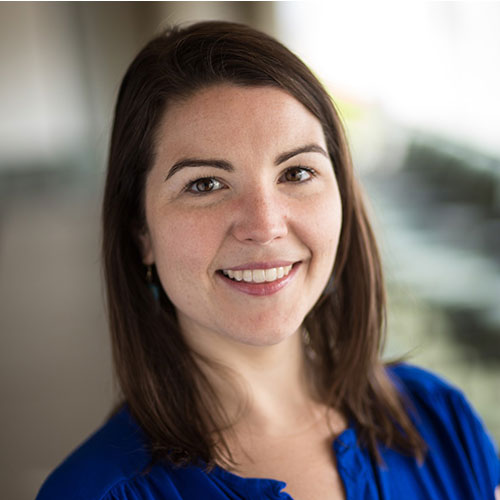Kate Barrett '07
Kate Barrett is the Francophone Africa program officer for the Advance Family Planning initiative at the Bill & Melinda Gates Institute for Population and Reproductive Health at the Johns Hopkins Bloomberg School of Public Health. In her role, Barrett regularly travels to several West African countries where she works with local partners to improve policies and funding for family planning and reproductive health.
 What was your first professional job after college?
What was your first professional job after college?
It was working at a foreign exchange organization. I was in the hosting department, so I worked to find host families for international exchange students. I wanted to do something in the international landscape, so it was a good foray into that environment, and I was able to incorporate my interest of intercultural communications.
After more than two years as a foreign exchange officer, Barrett started thinking about her desire to work in Paris. While a student, she had an opportunity to use her semester abroad to be part of the Institute for Field Education (IFE), which connects students to internships in Europe. She turned it down, but several years out of college, Barrett applied to the program.
What did you hope to gain from your IFE internship?
I particularly wanted to work with African immigrant populations in Paris and the surrounding areas. They placed me in an African run and led organization that specialized in administrative health services to people of African origin. The program created relationships with hospitals, schools, and ethno-psychiatrists, and also built bridges of understanding between medical staff and the cultural components that comprise any interaction.
What was it like to work entirely in French?
When I left to do the internship program I was so, so worried about my language level, because all this time had passed since my French studies. But I kept up with my French—because I’m a huge Francophile and a big nerd. When I got to Paris, I found out very quickly that I was way more advanced than almost all of the people in my program, so that was a little more reassuring. And then obviously, the internship program was entirely in French. That was interesting, too, because I had to learn different accents because I was working with people from various French-speaking African countries.
The next part of her career journey was “sheer dumb luck,” Barrett says. A week before she was to leave Paris, Barrett heard about a job opening from a friend of a friend of a friend. The United Nations Educational, Scientific, and Cultural Organization (UNESCO) was looking for a native English speaker who spoke French. Barrett applied and accepted the job three days before her flight to the U.S. She took the flight home to renew her visa, and then she returned to Paris.
What did you do for UNESCO?
I worked for the International Institute for Educational Planning (mostly administrative work done in French and English). The work I did was mostly on anti-corruption and transparency related to higher education in other countries. We worked with ministries and governments in conjunction with universities to responds to countries’ demands to improve education like accountability in financing, teacher management, academic fraud, etc.
Barrett returned to the U.S. in November 2012 and decided to attend graduate school for intercultural communication at the University of Maryland Baltimore County. Following her degree, Barrett started her role at the Bill & Melinda Gates Institute.
Why did you return for your master’s degree?
I thought it was super important to understand people from other cultures and that includes the cultural dynamics of communication. I was also very cognizant of the white savior complex, the idea of a white person who perceives themselves as helping non-white people in a self-serving manner. I was really aware of these issues and wanted to figure out how to still marry my interests and ensure that I wasn’t part of the problem.
How do you navigate your whiteness when working with people who are Black?
We try to ensure that our partners’ voices are heard, and not just that, but that we’re also not taking credit for their work. We use our intermediary role with global and donor organizations to increase the voice of our partners so that we’re not having these siloed conversations without the people who are doing the work. It is definitely ongoing work in both my personal and professional life.
